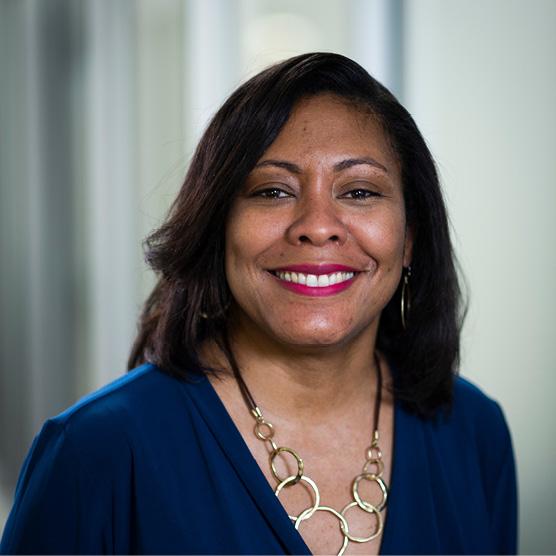

Associate Professor, Family Science
Associate Professor of Family Science Mia Smith-Bynum (she/her) identifies as a scholar-activist, harnessing her personal experience as a Black woman and vast research expertise to dismantle racism and improve African American mental health. As the director of the Black Families Research Group, an affiliate of the Center for Health Equity and an investigator with the University of Maryland Prevention Research Center (UMD-PRC), Dr. Smith-Bynum has quickly emerged as a necessary and leading figure in psychology and family science.
Dr. Smith-Bynum specializes in adolescent mental and sexual health as well as parent-adolescent communication, with a focus on Black family research. As a trained clinical psychologist, Dr. Smith-Bynum brings a multidisciplinary skillset and perspective to her work. She utilizes, “intensive observational methods in which [she] records discussions between parents and their adolescents in order to document the specific techniques that parents use to talk about this stressful topic in order to understand which techniques and practices are the most effective in shielding children from its effects.”
She takes this work a step further by connecting and contextualizing these interpersonal interactions within the systemic racism in the United States. “I focus on the effects of racism and racial discrimination on the mental health of African American youth. I also focus on the ways African American parents communicate with their teens about these issues and how to cope with them,” she explains.
Dr. Smith-Bynum also fights racism beyond external grants, NIH funding, and professional research journals. In a recent blog publication from this summer, “Too Many Names, Too Many Hashtags: The Killing of Unarmed Black People is a Public Health Pandemic,” Dr. Smith-Bynum calls for increased attention to police brutality. “We know that the shootings of unarmed Black people and the associated videos and news accounts are traumatic for Black families and that other forms of racism and discrimination also undermine the health of Black families,” she says. Dr. Smith-Bynum also leads UMD anti-racism teach-ins, other seminars and trainings for the campus community to understand how racism operates at the university level and provide guidance on how to adopt anti-racist policies and practices in higher education.
Dr. Smith-Bynum’s role as an investigator with the UMD-PRC was a befitting next career step. The UMD-PRC is committed to research, service, and training around issues of mental health among LGBTQ+ communities. Its mission is to eliminate existing health disparities and related social injustices experienced by LGBTQ+ persons. Dr. Smith-Bynum shares how she came to see her mission as closely tied to the center’s, “I came to be involved with the PRC because of my interest in understanding how marginalization and oppression undermine mental health specifically. Though the life experiences around race, sexual orientation, and gender have some distinct lived realities, I see useful parallels between the two areas of scholarship. And when you consider things from an intersectional perspective, we have people who are both people of color and also identify as LGB and/or trans or gender-diverse.”
Also strategically located near the D.C. area, the UMD-PRC gives Dr. Smith-Bynum the opportunity to continue to study multiple kinds of marginalization and allows her to continue fighting to dismantle systems of violence through many different channels.